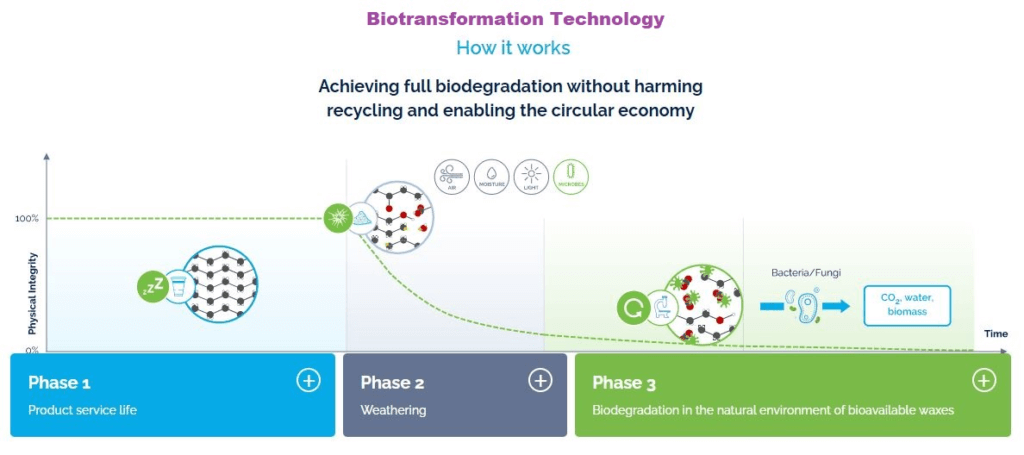Plastic pollution has become a global problem, and India is one of the major contributors to it. The country generates 3.5 billion kgs of plastic waste annually, with per capita plastic waste generation doubling in the past five years. Plastic waste from packaging contributes to a third of this, with e-commerce firms like Amazon generating nearly 210 million kgs of plastic from packaging waste in 2019. To address this issue, a U.K.-based startup has developed biotransformation technology that can make plastics biodegradable without leaving behind any microplastics.
What is biotransformation technology?
Biotransformation technology is a novel approach to ensure plastics that escape refuse streams are processed efficiently and broken down. Plastics made using this technology are given a pre-programmed time during which the manufactured material looks and feels like conventional plastics without compromising on quality.
Once the product expires and is exposed to the external environment, it self-destructs and biotransforms into bioavailable wax. This wax is then consumed by microorganisms, converting waste into water, CO2, and biomass. This biotransformation technology is the world’s first that ensures polyolefins fully biodegrade in an open environment causing no microplastics.

Need for biotransformation technology in India
Given the scale of plastic pollution in India, the biotransformation technology could be a game-changer. Plastic waste generation has been on the rise, and e-commerce firms like Amazon have been major contributors to it. While Amazon India has eliminated single-use plastics across its fulfilment centers, this technology can still be used to reduce plastic waste in other sectors like food packaging and healthcare.
Where can biotransformation technology be used in India?
Food packaging and healthcare are the two prime sectors that could use this technology to reduce waste. Some well-known Indian firms in food and packaging industries deploy such technologies. Within healthcare and pharma industries, this technology provides biodegradable solutions for non-woven hygiene products like diapers, sanitary napkins, facial pads, etc.
Initiatives by the Indian Government
- The Indian government has launched multiple initiatives to move towards sustainability.
- Introduction of plastic waste management gazette to tackle plastic pollution caused by single-use plastics.
- Ban on single-use plastics to stop its use in the country.
- National Dashboard on Elimination of Single Use Plastic and Plastic Waste Management to track progress in eliminating single-use plastic and managing waste effectively.
- Extended Producer Responsibility (EPR) portal to improve accountability, traceability, and compliance reporting in relation to EPR obligations.
- Development of a mobile app to report single-use plastics grievances and check their sale, usage, or manufacturing in their area.
Alternatives to reducing plastic waste
- While biotransformation technology is effective, it is not the only solution to reducing plastic waste.
- A switch to jute or paper-based packaging could potentially cut down plastic waste.
- Building sustainability within the paper industry and saving on the import bill on ethylene solutions.
- Wooden packaging is another alternative, but it may increase the packaging’s bulkiness and cost.
- The Government of Tamil Nadu organized a National Expo and Conference of Startups to raise awareness of alternatives to single-use plastics.
- Alternatives showcased at the expo were made using coir, bagasse, rice and wheat bran, plant and agricultural residue, banana and areca leaves, jute, and cloth.
Why In News
A U.K.-based startup has recently developed biotransformation technology, which has the potential to revolutionize the plastic industry by making plastics biodegradable without leaving behind microplastics.If this technology proves successful on a larger scale, it could significantly reduce the negative environmental impact of plastic waste and contribute towards a more sustainable future.
MCQs about Biotransformation Technology
-
The Indian government has launched which of the following initiatives to tackle plastic pollution caused by single-use plastics?
A. Plastic waste management gazette
B. Ban on double-use plastics
C. National Dashboard on Elimination of Double Use Plastic
D. Extended Producer Responsibility (EPR) portal
-
What is the name of the biotransformation technology developed by a U.K.-based startup that claims to make plastics biodegradable without leaving behind any microplastics?
A. BioPlast
B. BiodegTech
C. BioTransTech
D. BioCelTech
-
What kind of startup showcase was organized by the Government of Tamil Nadu to raise awareness on alternatives to single-use plastics?
A. National Conference of Startups
B. International Expo and Conference of Startups
C. National Expo and Conference of Startups
D. Regional Expo and Conference of Startups
Boost up your confidence by appearing our Weekly Current Affairs Multiple Choice Questions
![]()


